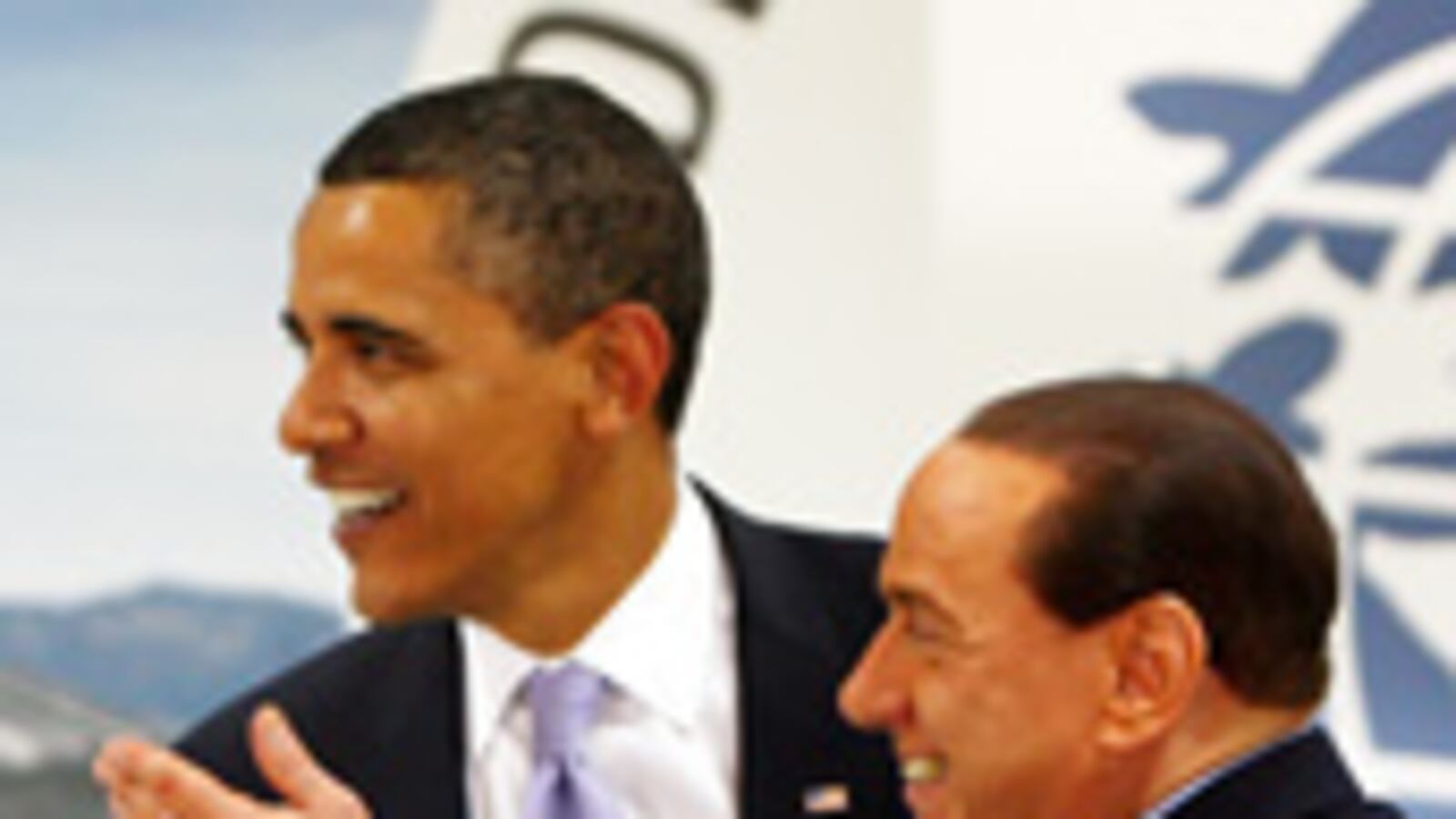
G-8 summits are often a source of comic relief, but this week’s gathering in a field of ruin—the earthquake-devastated town of L’Aquila, Italy—is an opera buffa without equal. The host is a man perennially caught in a web of scandals large and small, Prime Minister Silvio Berlusconi. He may have hosted three of these extravaganzas, but even as leaders from around the world tried to find room to land at the local airport, Berlusconi found himself denying reports that the Americans had to take over the Sherpa preparations that precede these events because the Italians were stumbling.
Berlusconi seemed unable to escape embarrassment. Because his wife is divorcing him over his allegedly too-keen interest in an 18-year-lingerie model, Berlusconi had to find somebody else to escort the wives of the summiteers on a round of distaff activities in Rome (German Chancellor Angela Merkel’s husband had stayed away). Step forward Equal Opportunities Minister Mara Carfagna, a 33-year-old former topless model and Miss Italia contestant—and, in fairness, former law student—of whom Berlusconi, 72, once said: “I would marry her, if I weren’t married already.”
The inadequacy of too many of the passengers in G-8 Club Class is another argument for keeping the conversation big.
Then Carla Bruni put the boot in. The Italian-born wife of French President Nicolas Sarkozy decided to skip Rome. Her relations with Berlusconi have been less than cordial ever since his reported boast (which he denied) that he, presumably meaning Italy, “gave” her to Sarkozy, not to mention his eyebrow-raising remark about Barack Obama’s “suntanned” appearance, a gaffe that moved Bruni to sniff that she was glad she had become French.
We could go on and on. But that would be missing a larger point. We tend to see these summits as set-pieces unto themselves, rather than for what they are: links in a chain, a series of chats in a long conversation. In Europe alone, Obama has attended half a dozen summits during his 170 days or so as president: the NATO, European Union and G-20 London summits earlier this year; and this week, a summit in Moscow, the one in L’Aquila, and a parallel get-together chaired by the president, the Major Economies Forum on Energy and Climate, a runup to perhaps the Everest of this year’s summits, the United Nations Climate Change Conference in Copenhagen in December.
We also, out of habit and a journalistic yearning to keep things simple, tend to focus too much on the trusty, familiar G-8. In even simpler times, in 1975, the G-8 actually started out as the Group of Six—the United States, the United Kingdom, West Germany (as it was), Japan, France, and Italy. As globalization took hold and trade became a centerpiece of these summits, more and more countries were added to the guest list; climate change and the financial meltdown have had the same bloating effect on the meetings. What was once an intimate club became a vast and crowded networkers’ bazaar. You may have missed, for example, the U.N.’s G-192 Conference on the World Financial and Economic Crisis and Its Impact on Development in New York last month, which was attended by, well, everybody.
The number of issues continues to multiply: the digital divide and transnational crime, terrorism and pandemics, food security and economic recovery. Given the proliferation of problems to talk about and “the rise of the rest”—of what were once smaller economic powers marching toward advanced development, countries like China and India and Brazil—it makes no sense to think small when it comes to summits. (One important exception: bilateral summits, like Obama’s with Russian President Dmitry Medvedev earlier this week, where one-on-one encounters can produce results; we’ll see whether Obama’s “you deal with Iran and we’ll re-think missile defense” gambit pays off.)
We should put the G-8 out of its misery and let it die in the rubble of L’Aquila. In these complex and turbulent times, eight isn’t enough; even Berlusconi recognized that in inviting “lesser” leaders to be present. The same logic will someday crack the exclusive clique on the U.N. Security Council. What really counts across our sometimes wretched, rapidly changing global landscape, even more than the big, ongoing conversation, is leadership, and the lack of it these days is a source of real concern among serious politicians and thinkers who follow international affairs. In his brief time as president, Obama has met most people’s expectations as a singularly gifted leader. He is, unfortunately, almost alone on the stage.
Among the G-8, to return to the darlings of summitry for a moment, other than Obama, only Sarkozy stands out as a leader of real political muscle, and yet Sarkozy seems inconsistent and lacking in global vision. Prime Minister Gordon Brown has a vision, but his voice is barely audible because British voters have given up on him as a lost cause. We needn’t go down the list. The point is that the inadequacy of too many of the passengers in G-8 Club Class is another argument for keeping the conversation big—and for keeping the likes of India’s Manmohan Singh and Brazil’s Luiz Inácio Lula da Silva in the loop.
Stryker McGuire is an American journalist working in London. McGuire is a contributing editor at Newsweek magazine, where he was a correspondent, bureau chief and editor for 30 years; the founding editor of International Quarterly , and an associate at Lombard Street Research, an economics consultancy in the City of London.






